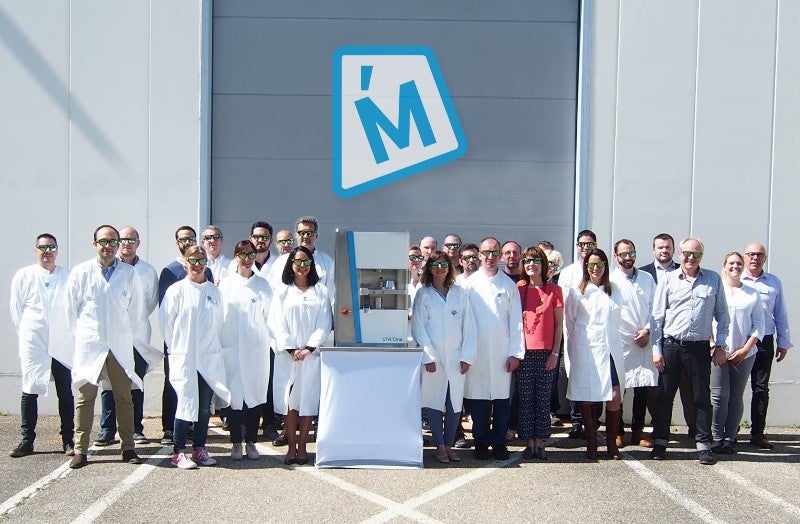
The drug development process for a solid dose pharmaceutical product can take companies an average of ten years, starting with the initial discovery of a promising compound. After extensive formulation development, preclinical testing and clinical trials, the drug development journey closes with a New Drug Application (NDA) being filed to the FDA.
But it would be wrong to say that the challenges end there. While the FDA reviews the NDA, a critical moment lies closely around the corner. In the last steps of FDA approval, production will move from the R&D department to the factory floor, powder quantities will increase from 10g to 50kg, and the once-small laboratory equipment used to produce tablets is now a huge press capable of compressing 500,000 tablets per hour.
As the recipe becomes ready for high-speed manufacturing, changes to the tablet’s compression behaviour frequently occur and defects are common. At this point, discovering a problem with the recipe could be catastrophic to production yields.
Tableting scale-up is a problem the pharmaceutical industry has been facing for decades, and it’s an issue that one company is on a mission to solve through innovative compaction simulation technology.
The MEDELPHARM story
Established in 1989 under the name of Medelco specialised in mechanical parts and specialty equipment, MEDELPHARM got started in the tableting industry by offering refurbishment services. “We were refurbishing tablet presses like a garage repairing other manufacturer’s cars,” says CEO Bruno Villa. Through this work, the company soon caught wind of the issues manufacturers were facing at scale-up and saw a way to help.
“Since we came from repairing production presses and then went on to acquire expertise in formulation and R&D, we were able to merge the requirements of production for simplicity and reliability with the necessities of R&D, which is precision and speed. With compaction simulation technology, scientists have the ability to project themselves into the future during early research. The machine MEDELPHARM patented in 1999 can make one tablet, with only a few grams of powder, at the speed of any full-scale production press,” explains Villa.
The ability to carry out small-volume batches at R&D stage with a machine that simulates high-speed production has the power to revolutionise the tableting industry. According to MEDELPHARM, the only similar technology previously available on the market was a huge hydraulic machine that was not user friendly, costing upwards of a million euro, and with the risk of dripping oil into tablets.
While MEDELPHARM’s initial invention was a fully mechanical machine, this evolved in 2008 into what is now known by pharma labs around the world as the STYL’One Evo.
“The Evo came as an evolution and a learning from MEDELPHARM,” says Villa. “We used an electromechanical technology, a mechanical machine – very strong, sturdy, and repeatable – driven by a computer. The computer makes the punches move and simulates different presses, including roller compaction. The big success came from there.”
A powerful R&D tool
Close to 300 laboratories around the world are accelerating their early development with this flexible machine. Key to this is the MEDELPHARM motto: ‘R&D equipment made by people for people’. Ingrid Coyle, MEDELPHARM’s director of corporate business development and communication, believes this is the STYL’One Evo’s big selling point:
“In the end you have to look who is using the equipment. You have to look at all the operators in the different companies who change all the time, and you have to train them again. If this is too complicated, you lose a lot of time. We made a machine that is really easy to use; the software is menu-driven, and it really guides you through the process.”
In short, a machine that is not limited to scientists and can be operated by anyone.
The end result is a powerful set of data for pharmacists, giving teams the information they need to perform in-depth material characterisation, robust formulation development, and risk-mitigated scale-up. “We give all the keys to the scientists, so that they can make their own analysis but with reliable and precise data,” says Quentin Boulay, product marketing manager at MEDELPHARM.
So far, the company’s story has been one of constant innovation, and it continues to be so. New software modules and equipment accessories are continually added, as Coyle says: “we are innovating all the time.” These add-ons are compatible with the existing base, further protecting the customer’s investment.
In recent years, MEDELPHARM concentrated all this innovation down by launching the little sister of the STYL’One Evo. The STYL’One Nano is based on the same hardware and software but in a portable, bench-top size. “The Nano was really developed to provide a tool to even more people,” Boulay explains. “It’s more affordable and more compact, but still a very high-end tablet press with a lot of data we can provide.”
Another point Boulay is quick to add is the MEDELPHARM expertise that comes with any purchase of its equipment. “Customers don’t just invest in hardware and software; they also bring in expertise and skills. We have a team of experienced scientist here that can support them with training. The idea is to give scientists the right tool but to help them use it to get more knowledge. It’s a key point in the STYL’One philosophy.”


